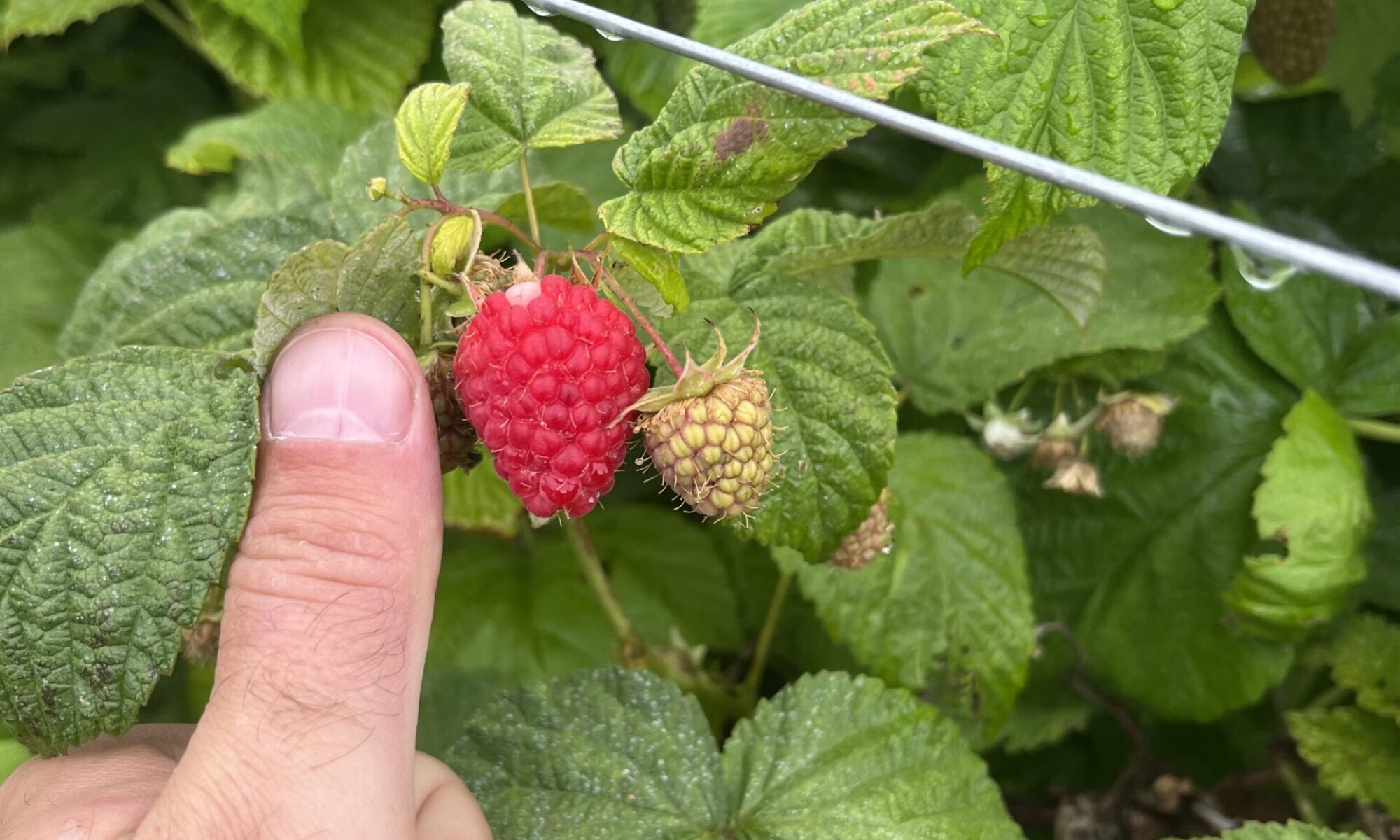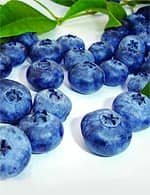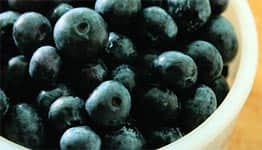
| LE Magazine Special Edition, Winter 2005/2006 | ||||
Blueberries — The World’s Healthiest Foodby William Faloon |
||||
Over the past year, a record number of independent studies have confirmed the health effects of blueberries. Scientists tested blueberries against an array of common disorders and discovered significant results. Most impressive was the ability of blueberries to improve memory as well as undo some of the degenerative changes seen in aging neurons. One study showed that the effect of blueberries in suppressing free radical and inflammatory damage in the brain was analogous to long-term calorie restriction. These findings hint that blueberries might be able to reverse certain aspects of brain aging! Scientists at the U.S. Department of Agriculture’s Human Nutrition Research Center on Aging proclaimed blueberries to be one of the world’s most healthful foods. The media responded by publishing numerous reports attributing wide-ranging benefits to blueberries. Researchers at the U.S. Department of Agriculture tested more than 100 different kinds of food for total antioxidant capacity per serving. The study included 24 types of fruits, 23 types of vegetables, 10 types of nuts, 4 types of dried fruits, and 16 types of herbs and spices. Blueberries, both wild and cultivated, scored highest in total antioxidant capacity per serving among all the fruits, vegetables, spices, and herbs tested.1 Packed with unique antioxidants, blueberries neutralize free radical damage to the collagen matrix of tissues that can lead to a host of degenerative disorders. The blue-red pigments found in blueberries improve the integrity of support structures in the skin, joints, and vascular system. Blueberry pigments have been shown to enhance the effects of vitamin C, improve capillary integrity, and stabilize the collagen matrix (the structural substance of all body tissues). These pigments work primarily by preventing free radical and inflammatory damage. Recent studies, however, have identified exciting new mechanisms by which blueberries guard our precious health. Maintaining Arterial StructureBlueberry extracts help maintain healthy blood flow via several mechanisms including inhibition of LDL oxidation, decreased platelet aggregation, and reduced inflammation. Blueberries also help maintain healthy endothelial function by preserving nitric oxide bioavailablity. The endothelium is a thin layer of cells that lines the inner arterial wall. Aging and poor health habits results in endothelial cells becoming dysfunctional, which leads to atherosclerosis. A study published in the August 2005 issue of the Journal of Medicinal Food shows that blueberries function via multiple mechanisms to protect against endothelial dysfunction. The scientists who conducted this study stated that consumption of blueberries even in late life could improve endothelial function. The conclusion of these scientists was: “Whole wild blueberries may have implications in blood pressure regulation and could prove to have a therapeutic role in improving cardiovascular health.”2 Improving MemoryStudies of human populations suggest that high intakes of fruits and vegetables reduce the incidence of degenerative neurological disorders. In a study published in the journal Pharmacological Research (August 2005), blueberry extract fed to rats for 30 days resulted in improved learning on several cognitive performance tests. The researchers concluded that blueberries may be beneficial in the prevention of age-related memory deficits.3
Blueberry Crosses Blood-Brain BarrierAt the University of Barcelona-Spain, scientists have shown that blueberry is effective in reversing age-related deficits in neuronal signaling and behavioral parameters. What was unclear, however, is whether the active constituents in blueberry actually cross the blood-brain barrier. In a study published in the April 2005 issue of Nutritional Neuro-science, these same scientists fed blueberry to rats for 8-10 weeks. Analysis of the brains of these rats indicated that blueberry phytochemicals had indeed crossed the blood-brain barrier and were found in regions of the brain responsible for memory and learning (e.g. the cerebellum, cortex, hippocampus, and striatum) of the blueberry supplemented rats, but not the controls (that did not receive blueberry extract). These findings are the first to show that blueberry compounds cross the blood brain barrier and localize in various brain regions important for learning and memory. Most significantly, these scientists found that greater concentrations of blueberry in the brain cortex correlated with enhanced cognitive performance.4 Reversing Brain AgingIn a study published in the September 1999 issue of the Journal of Neuroscience, rats supplemented with blueberry starting at the age of 6 months showed reduced age-related declines in neuronal and cognitive function. When 19-month old rats were supplemented with blueberry, the effect was a reversal of many age-related deficits. The scientists concluded the study by stating antioxidant rich foods may be beneficial in reversing the course of neuronal and behavioral aging.5 Move forward to year 2005, and scientists at Tufts University discover a specific mechanism by which blueberries are able to reverse neurological aging. When cells are exposed to toxic stress factors such as free radicals or inflammatory inducers, a protective mechanism involves the generation of heat shock proteins. Young organisms readily generate heat shock proteins to protect against free radicals and other toxic agents, but older organisms are unable to generate these protective heat shock proteins in sufficient quantity. In a study published in the April 2005 issue of Neurobiology Aging, scientists supplemented the diets of young and old rats with blueberry. A group receiving no blueberry served as the control. After 10 weeks, the brains of these rats were subjected to an inflammatory challenge and the heat shock protein response was measured. As expected, the brains of young rats produced a strong heat shock protein response, while the old rats made very little protective heat shock protein. The old rats supplemented with blueberry, however, produced as much heat shock protein as the young rats. In this study, the blueberry diet completely restored the heat shock protein response of old rats to that of young rats. This suggests that short-term blueberry intervention may result in protection against a number of neurodegenerative processes in the brain.6
Protecting Against Brain IschemiaWhen blood flow is interrupted to the brain, significant and permanent damage often results. Blueberries may significantly lessen this damage, suggests a study published in the May 2005 issue of the Journal of Experimental Neurology. In this study, rats fed diets enriched with blueberries, spinach, or spirulina suffered the loss of fewer brain cells and recovered significantly more of their ability to move following a blood flow interrupting event. The size of the area of the brains damaged in the rats receiving the blueberry, spinach, or spirulina diets was significantly less than the control group.7 Improving Auditory ProcessingScientists explored whether a 2-month dietary supplementation of blueberry extract could reverse or retard the age-related decline in temporal auditory processing speed observed in the aged rat. As reported in the August 2005 issue of Neuro-biology Aging, aged rats supplemented with blueberry responded vigorously to measurements in the primary auditory cortex of the brain compared to the control group not receiving blueberry. The improvement was so significant that the aged rats fed blueberry were very similar to younger rats. The scientists concluded: “These results suggest that age-related changes in temporal processing speed in the primary auditory cortex may be reversed by dietary supplementation of blueberry phytochemicals.”8
Enhancing Survival of Neural TransplantsTransplantation of neural tissue has been explored as a potential therapy to replace dead or dying cells in the brain, such as after brain injury or neurodegenerative disease. However, survival of transplanted tissue is poor, especially when the transplant recipient is of advanced age. Even middle-aged host animals exhibit poor survival after fetal hippocampus transplants. In a study published in the journal Cell Transplant (2005), when middle aged rats were supplemented with blueberry extract, hippocampal graft growth was significantly improved and cellular organization of grafts was comparable to that seen in tissue grafted to young host animals. This study corroborates previous studies that have demonstrated improvement of neuronal deficits in aged animals given a diet supplemented with blueberry extract.9 Inhibiting MetastasisCancerous cells are able to grow and invade surrounding tissue by secreting enzymes that break down the surrounding matrix that would otherwise confine them. A study published in August 2005 in the Journal of Nutritional Biochemistry showed that blueberry flavonoids down-regulate these structure-degrading enzymes that enables cancerous cells to spread and invade other tissues.10 Controlling Undesirable Cell DivisionHealthy cell division involves regulated cell proliferation and normal programmed cell destruction (apoptosis). In a study published in the September 2005 issue of the Journal of Agriculture Food Chemistry, colon cancer cells that were growing and dividing abnormally were exposed to blueberry extract. The results showed that proliferation was impeded by 50% and factors necessary to induce apoptosis were activated. The scientists who conducted this study stated that blueberries may help reduce colon cancer risk.11 SummaryBlueberries have the highest antioxidant capacity of all fruits and vegetables. Recent studies, however, indicate that blueberries possess multiple, diverse health benefits including maintaining and enhancing endothelial function, helping to prevent age-related memory and learning deficits, rejuvenating brain cell function, and helping to prevent cancer. Strong scientific evidence shows that blueberries protect against the most prevalent age-related maladies. Logically, liberal blueberry consumption is a critical strategy to obtain optimal benefit and protection against age-related changes. |
||||
| References | ||||
| 1. Wu X, Beecher GR, Holden JM, et al. Lipophilic and hydrophilic antioxidant capacities of common foods in the United States. J Agric Food Chem. 2004 Jun 16;52(12):4026-37.
2. Norton C, Kalea A, Harris P, et al. Wild blueberry-rich diets affect the contractile machinery of the vascular smooth muscle in the Sprague-Dawley rat. J Med Food. 2005, 8;(1):8-13. 3. Ramirez MR, Izquierdo I, Rasseira MD, et al. Effect of lyophilized Vaccinium berries on memory, anxiety and locomotion in adult rats. Pharmacol Res. 2005 Aug 9; [Epub ahead of print]. 4. Andres-Lacueva C, Shukitt-Hale B, Galli RL, et al. Anthocyanins in aged blueberry-fed rats are found centrally and may enhance memory. Nutr Neurosci. 2005 Apr;8(2):111-20. 5. Joseph JA, Shukitt-Hale B, Denisva NA, et al. Reversals of age-related declines in neuronal signal transduction, cognitive, and motor behavioral deficits with blueberry, spinach, or strawberry dietary supplementation. J. Neurosci. 1999 Sep 15;19(18):8114-21. 6. Galli RI, Bielinski DF, Szprengiel A, et al. Blueberry supplemented diet reverses age-related decline in hippocampal HSP70 neuroprotection. Neurobiol Aging 2005 Apr 30; (Epub ahead of print) 7. Wang Y, Chang CF, Chou J, et al. Dietary supplementation with blueberries, spinach, or spirulina reduces ischemic brain damage. Exp Neurol. 2005 May;193(1):75-84. 8. de Rivera C, Shukitt-Hale B, Joseph JA, et al. The effects of antioxidants in the senescent auditory cortex. Neurobiol Aging 2005 Jun 9;(E-pub ahead of print). 9. Willis ., Bickford P, Zaman Y, et al. Blueberry extract enhances survival of intraocular hippocampal transplants. Cell Transplant 2005;14(4):213-23. 10. Matchett MD, Mackinnon SL, Sweeney MI, et al. Inhibition of matrix metalloproteinase activity in DU145 human prostate cancer cells by flavonoids from lowbush blueberry (Vaccinium angustifolum) : possible roles for protein kinase C and mitogen-activated protein-kinase-mediated events. Nutr Biochem. 2005 Aug 17 (Epub ahead of print). 11. Yi W, Fischer J, Krewer G, et al. Phenolic compounds from blueberries can inhibit colon cancer cell proliferation and induce apoptosis. J Agric Food Chem. 2005 Sep 7;53(18):7320-9. |
Original article found here: https://www.lifeextension.com/Magazine/2005/SS/blueberry/Page-01




